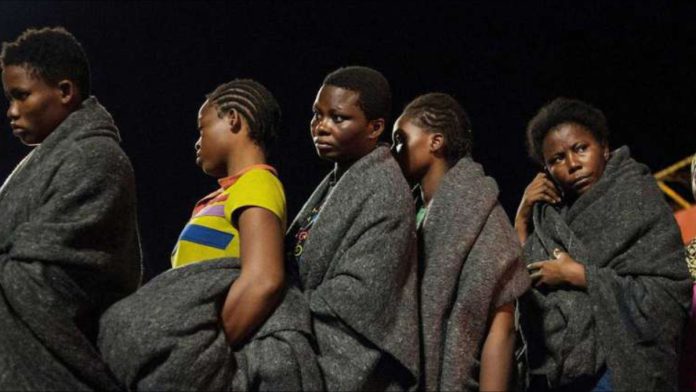In the midst of the potent economic woes bedeviling the country, human trafficking is on the rise as humans are selling their fellows into slavery, DAUDA ISMAIL writes.
While human trafficking remains a critical issue globally, Nigeria has been identified as a source, transit, and destination country for human trafficking. This has been worsened by factors such as poverty, lack of opportunities, internal displacement, and social instability contributing to the vulnerability of individuals to trafficking.
The situation in Nigeria is exacerbated by organized crime syndicates that exploit victims for forced labor, sexual exploitation, and other forms of modern slavery. Women and children are particularly vulnerable, with many being trafficked within the country or across borders.
About a fortnight ago, Nigerians were greeted with the news of about 11 teenage girls, between the ages of 15 and 16, that were rescued by the Nigerian authorities. The girls were said to have been trafficked for prostitution in Ghana after being reportedly lured with promises of a better life.
Three of the victims are from the same parents, while the suspect, a Nigerian man, was arrested.
According to Abike Dabiri-Erewa, the Chairman of Nigerians in Diaspora Commission, the girls were rescued after a tip-off by NIDO, the umbrella body of Nigerians living in Ghana.
According to her, the victims were said to have revealed that they were beaten, molested, and forced into prostitution without pay, saying that their phones were reportedly seized, and they were unable to contact their parents.
According to one of the girls, “They give us out to men, and they don’t give us money; they collect everything.”
Dabiri-Erewa called on the National Agency for the Prohibition of Trafficking in Persons to take decisive action, describing the situation as “very, very heartbreaking.”
Barely a week later, two additional girls were rescued by authorities in Ghana.
According to reports, for the years 2021 and 2022, Benue State had the highest number of rescued victims of human trafficking, followed by Ondo, Edo, Delta, Kano and Imo.
Although there is a reduction in the number of victims from Edo State, however, Edo indigenes are the highest perpetrators of human trafficking within and outside Nigeria.
“In 2022, we received 1,464 reports, which was a 31.9 per cent increase from 2021. In terms of prosecution, 80 convictions were secured in 2022 – the highest in a single year since NAPTIP’s inception,” Waziri-Azi was quoted to have said.
At another event held to commemorate the 20th anniversary of NAPTIP in July, Waziri-Azi noted that about 1.6 million Nigerians are living in modern slavery daily.
She said, “Only recently did the 2023 Global Slavery Index opine that globally, it is estimated that 50 million people were living in modern slavery on any day in 2021, an increase of 10 million people since 2016.
What this narrative indicates is the urgent need for a more strategic and deliberate global response to these problems. As of May 2023, 1.6 million people are living in modern slavery in Nigeria, according to the Global Slavery Index.”
Modern slavery operates as a ‘hydra-headed monster’ in the form of human trafficking, which involves the use of violence, threats, or coercion to transport, recruit, or harbour people in order to exploit them.
Trafficked victims are often forced into prostitution, labour, criminality, marriages, or have their organs harvested.
During the yearly colloquium of Epiphany Azinge Foundation held in Abuja on November 13, the Director-General of the National Agency for the Prohibition of Trafficking in Persons, Prof Fatima Waziri-Azi, disclosed that Benue State has been ranked Nigeria’s epicentre of human trafficking between 2021 and 2022, with Ondo, Edo, Delta, Kano and Imo following closely and respectively in the infamous list.
For the years 2021 and 2022, Benue State had the highest number of rescued victims of human trafficking, followed by Ondo, Edo, Delta, Kano and Imo. There is a reduction in the number of victims from Edo State. However, Edo indigenes are the highest perpetrators of human trafficking within and outside Nigeria.
“In 2022, we received 1,464 reports, which was a 31.9 per cent increase from 2021. In terms of prosecution, 80 convictions were secured in 2022 – the highest in a single year since NAPTIP’s inception,” Waziri-Azi was quoted to have said.
At another event held to commemorate the 20th anniversary of NAPTIP in July, Waziri-Azi noted that about 1.6 million Nigerians are living in modern slavery daily.
She said, “Only recently did the 2023 Global Slavery Index opine that globally, it is estimated that 50 million people were living in modern slavery on any day in 2021, an increase of 10 million people since 2016.
What this narrative indicates is the urgent need for a more strategic and deliberate global response to these problems. As of May 2023, 1.6 million people are living in modern slavery in Nigeria, according to the Global Slavery Index.”
In spite of the several arrests over time, the security agencies appear to be overwhelmed as the agents continually come up with ways to stay ahead of them.
The criminals have resorted to the use of violence, threats, or coercion to transport, recruit, or harbour people in order to exploit them, thereby making it near impossible for victims to speak up.





